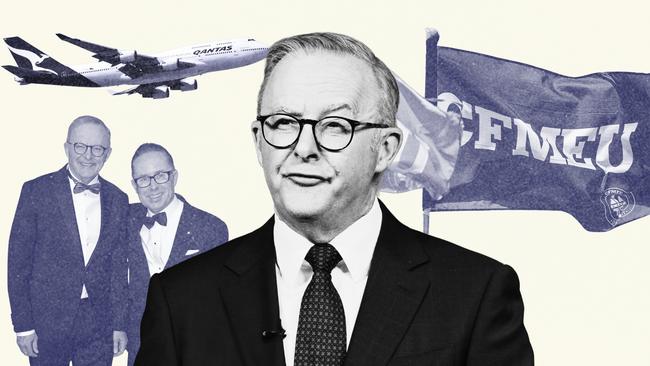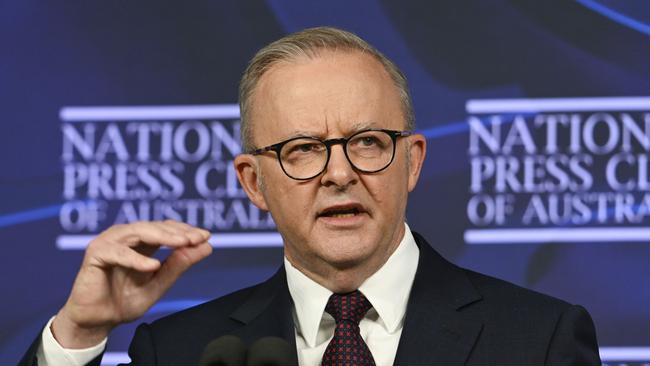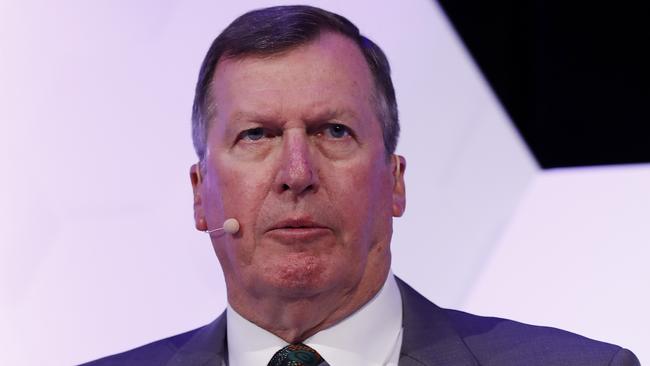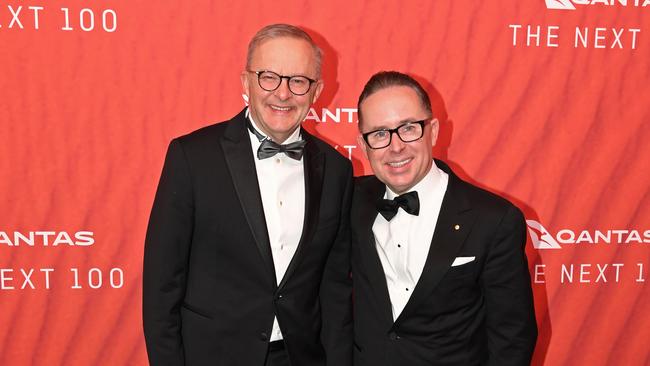
“There is no day in which we say: ‘Okay what’s our personal interest here rather than the national interest’,” he declared.
This cannot be emphasised enough. Blinded by ignorance and ingratitude, too many of us believe Albanese and his fellow careerists act according to self-interest instead of the national interest. This is both cynical and slanderous. There are many, many examples of the Albanese government fulfilling its civic responsibilities.
It was, for example, acting in the national interest when it abolished the Australian Building and Construction Commission, thus ensuring the militant thugs of the Construction, Forestry, Maritime, Mining and Energy Union, so vital to Labor’s support base, could operate unimpeded.

Without doubt, the government was acting in the national interest when it later refused to hold a royal commission into revelations the construction industry was rife with bribery, standover tactics, and CFMEU delegates linked to outlaw motorcycle gangs. Ignoring calls to deregister the organisation, Albanese did the bare minimum in appointing an external administrator to the union. Giving the kid glove treatment to union corruption is in the national interest, you see.
When it comes to industrial relations, nothing says “We’re working in the national interest” better than working solely on behalf of unions, the members of which comprise just 8.2 per cent of private sector workers. Forcing industries into multi-employer bargaining is also in the national interest, because it increases union membership and leaves employers at the mercy of organised labour. Admittedly that will only exacerbate labour productivity in Australia, which currently sits at 30 out of the 35 richest countries, but this is hardly a national interest issue.
It was in the national interest when Albanese attempted to entrench a far-left race-based activist group in the constitution. He was acting in the national interest when he refused to elaborate on its governance and composition, just like he was when he dismissed calls to hold a constitutional convention into the proposal.
Make no mistake: Albanese was also acting in the national interest when he decided not to hold a royal commission into the response to the Covid-19 pandemic, despite having promised in opposition he would consider one. As any reasonable person would tell you, Albanese’s decision had nothing to do with shielding Labor state leaders from scrutiny, especially former Victorian premier Daniel Andrews.

Speaking of national interest, former chief of army Peter Leahy last year observed that Australia had become a “strategic liability” to the US, saying it was stretched too thin and unready to fight at short notice. No need to worry. Thanks to Albanese, we have an enormous civilian army, otherwise known as the Australian Public Service, which has grown 16.4 per cent during the last two years. It is about increasing the number of public servants who owe their job to Labor, which is in the national interest.
Remember when Transport Minister Catherine King knocked back Qatar Airways’ proposal to increase its number of flights into Australia? Allowing that to go ahead was “not in the national interest”, she insisted.
Let’s explore this rationale. King’s department recommended she approve this, but she decided it would not be in the national interest to force Qantas, which has a well-earned reputation for price-gouging and screwing over Australian travellers, to operate in a more competitive market. That’s the same Qantas that was shilling for Albanese’s referendum proposal, as well as giving him a bucketload of upgrade freebies.
And while we are talking about the flying kangaroo, surely we all agree it was in the national interest for the Prime Minister to ask then Qantas CEO Alan Joyce to provide his son Nathan with membership of the Chairman’s Lounge. Just like it was in the national interest for Albanese to fail to disclose that benefit in his parliamentary statement of registrable interests.

Thanks to Labor’s pipe dream obsession with renewables, we can expect an economic and energy catastrophe, as well an environmental one. Treasurer Jim Chalmers compounds this problem by turning the $230bn Future Fund into a political slush fund for subsidising this folly. But just ask any of the many Labor figures now employed in Australia’s fastest-growing rent-seeking industry, and they will assure you Chalmers is one with the national interest.
And rest easy in knowing that Albanese’s response, or rather non-response, to soaring anti-Semitism in Australia is entirely in the national interest. It was also in the national interest to appease Middle Eastern voters in the safe Labor seats of Western Sydney by drawing a false equivalence between anti-Semitism and Islamophobia, just as it was for Labor to side against Israel in the UN following Hamas’s terrorist attacks of October 7.
As for the wave of anti-Semitism that began in Australia shortly after that day, Albanese waited more than a year before calling a national cabinet meeting in response. Why the long delay? National interest considerations, obviously.
For the record, Albanese’s speech last week went for 25 minutes. During that period, he attacked the Coalition 51 times, or once every 30 seconds. That is because it is in national interest for a prime minister, having spent three years in office, to carry on as if he were still opposition leader. (Consistent with Albanese’s capacity for self-awareness, he claimed the election was a choice between Labor’s “determination and optimism”, and the Coalition’s “fear and negativity”.)
Incidentally, that speech was almost three years to the day when then prime minister Scott Morrison addressed the press club. On that occasion (also an election year) NPC president and ABC 7.30 chief political correspondent Laura Tingle sought to humiliate Morrison by calling on him to apologise for his failings as prime minister, all of which she recited for effect.
Tingle also officiated at Albanese’s recent appearance at the club, but for some reason she did not spring that stunt on him. Or did I miss that part?




According to Anthony Albanese, the government he leads exemplifies a selfless devotion to public duty. Speaking at the National Press Club (NPC) last week, the Prime Minister invited us to join him in marvelling at the instinctive altruism that determines his every move.